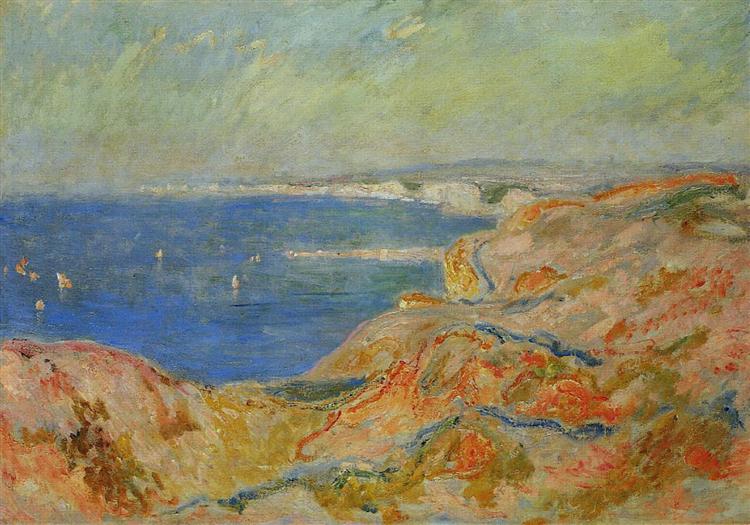Opis
Praca „w klifie w pobliżu Dieppe” (1897) autorstwa Claude Monet jest żywe i intymne świadectwo unikalnego podejścia artysty w kierunku światła i koloru, określając cechy impresjonizmu, którego Monet jest jednym z najważniejszych wykładników wykładników . Ten obraz, który oddaje majestat przybrzeżny krajobraz Dieppe w Normandii, odzwierciedla fascynację artysty ze zmieniającym się skutkami światła i klimatu na środowisko naturalne.
W tej kompozycji Monet przedstawia stromy klif, który silnie stoi nad morzem, który jest reprezentowany w różnych niebieskawe odcienie, które obejmują głęboki kobalt i jasnoniebieski, tworząc grę cieni i świateł, które są prawie hipnotyczne. Powierzchnia morza jest gęsta ruchu, z falami, które wydają się skakać z płótna, technika, której Montistrally używa do sugerowania zarówno konsystencji wody, jak i żywej atmosfery sceny.
Sam klif jest pobity przez światło, które wydaje się wyciekło przez przybrzeżną mgłę, reprezentowaną w szarych i białych niuansach, które kontrastują z nasyconym błękitem oceanu. Chociaż jest to obraz naturalnego krajobrazu, w pracy brakuje namacalnej obecności człowieka, która pozwala widzowi w pełni skoncentrować się na związku między Ziemią a morzem oraz o tym, jak te elementy są połączone przez światło.
Walka Monet w tej pracy, która jest lekka i luźna, pozwala na dynamizm i odczucie bezpośredniości, które wywołuje bezpośrednie doświadczenie bycia na wybrzeżu. Dzięki tej technice artysty udaje się przekazywać nie tylko kształt skał i fal, ale także zmieniającą się atmosferę momentu, w którym została pomalowana. Praca z czasem oddaje określony moment, ale sugeruje również naturalną ciągłość, pokazując, jak światło może przekształcić krajobraz w doświadczenie wizualne i emocjonalne.
„W klifie w pobliżu Dieppe” został stworzony na okres, w którym Monet zdobył już uznanie, a jego styl się skonsolidował. Ten obraz jest zgodny z jego poszukiwaniem, aby uchwycić efekty światła i koloru w różnych krajobrazach, które można znaleźć w całej jego rozległej produkcji artystycznej. Monet namalował kilka dzieł Dieppe, odzwierciedlając jego szczególne zainteresowanie kontrastami między naturą a elementami klimatycznymi.
Wybór Dieppe jest szczególnie znaczący, ponieważ dla Monet wybrzeża te były nie tylko miejscem pracy, ale także schronieniem inspiracji. Praca jest wyraźnym odzwierciedleniem jego pragnienia uchwycenia nie tylko widoku, ale także doświadczenia sensorycznego miejsca, które zaprasza widza do niemal wysłuchania szeptu fali i poczuć bryza morska.
Podsumowując, „w klifie w pobliżu Dieppe” jest to arcydzieło, które ucieleśnia ducha impresjonizmu, osiąga bezpośredni związek między sztuką a naturą. Monet, dzięki wyjątkowej dbałości o światło i dziedzinie techniki obrazkowej, oferuje okno do świata, w którym krajobraz ożywa, przekształcając scenę przybrzeżną w wzniosłe doświadczenie koloru i kształtu. Ta praca jest nie tylko świadectwem talentu Monet, ale także przypomnienia o mocy sztuki, aby uchwycić esencję czasu i przestrzeni.
KUADROS ©, słynna farba na ścianie.
Ręcznie wykonane obrazy olejne, z jakością profesjonalnych artystów i charakterystyczną pieczęcią KUADROS ©.
Usługa reprodukcji zdjęć z gwarancją satysfakcji. Jeśli nie jesteś w pełni zadowolony z repliki twojego obrazu, zwrócimy twoje pieniądze w 100%.

